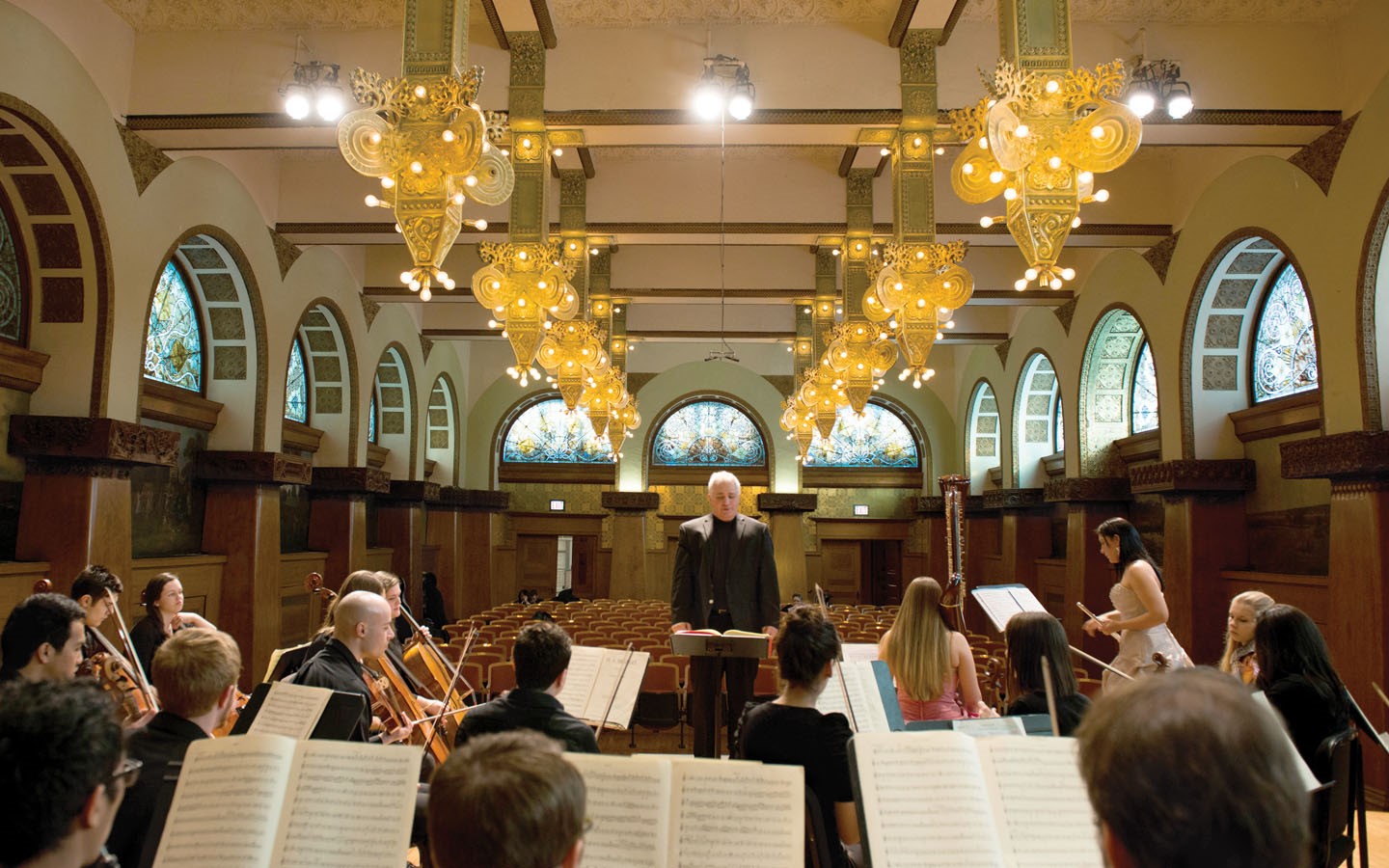
Ganz Hall is a treasured rehearsal space for CCPA students.
The story is lore at Roosevelt University: In September 1871, four years after founding the Chicago Academy of Music, Florenz Ziegfeld, Sr. — father of the famous Broadway impresario — moved his increasingly popular music conservatory to a new building, which promptly went up in flames during the Great Chicago Fire.
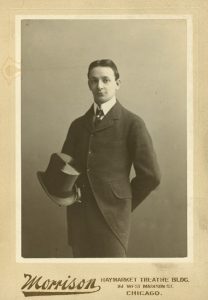
Rudolph Ganz
Undeterred, Ziegfeld reopened his school in less than three months. The following year, he changed the school’s name to the Chicago Musical College (CMC), charging more than 900 students “tuition” of a dollar per lesson.
Thereafter, CMC retained its name for the next 125 years, through its merger in 1954 with Roosevelt University’s School of Music and up until 1997, when the administration combined Roosevelt’s music and theater programs into a new entity: the College of Performing Arts.
Three years later, then-dean James Gandre added “Chicago” to the name in order to symbolically reconnect the college with its storied past, creating what we now know as the Chicago College of Performing Arts (CCPA).
Artistic Courage
CCPA celebrates the 150th anniversary of its founding this year. To mark the occasion, thousands of students, alumni, donors and interested Chicagoans will gather on March 14, 2018 at Roosevelt’s historic Auditorium Theatre for the college’s annual Vivid concert and fundraiser, showcasing the talent and achievements of CCPA’s students, faculty and alumni.
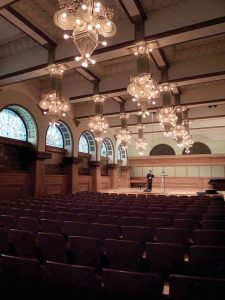
Ganz Hall
Before the applause for that special evening dies down, however, it is worth reflecting on the spirit of perseverance and courage forged by that fire 150 years ago. It took an extraordinary act of optimism for Ziegfeld and his staff to look past the smoldering char and ash of their former building and envision a future unmarred by disaster. Like the city of Chicago itself, they used the fire as an opportunity to rebuild and rebound, to rededicate themselves to their great project of establishing a European-style cultural institution in the heart of the American Midwest.
Courage, resilience, optimism, and heart — these qualities are seared into the DNA of CCPA, and manifest themselves every day in the classrooms, studios and rehearsal halls of the college. In these spaces high above Michigan Avenue, a new generation of aspiring artists learns what it can from those who have gone before them — what it means to be an artist, a professional, a purveyor of imagination and master of artistic craft. They then take the most daring leap of all: into a public and culture that does not necessarily appreciate or care how hard they have worked to acquire their skills, only how easy they can make it look when they get up on stage to perform.
“It takes courage to be an artist,” said Joel Fink, founding director of CCPA’s 20-year-old theater program and its former dean. “The phrase I often use with my students is ‘Developing the courage to create.’ Creative courage means the ability to embrace the unknown, to create something where there was nothing before. Our job is to give our students the skills and craft to have that kind of courage.”
“Creative courage means the ability to embrace the unknown, to create something where there was nothing before. Our job is to give our students the skills and craft to have that kind of courage.”
– Joel Fink, Founding Director of the CCPA Theatre Conservatory
Most students attend CCPA with the intention, or at least aspiration, of becoming a professional musician or actor/performer. Toward that end, the college’s programs are designed to teach students not only the technical skills they will need to be working professionals, but also acquaint them with the personal and practical habits necessary to survive as professional artists.
Auditions, rejection, practice, humility, sacrifice, hustle and failure are just a few of the slings and arrows a working artist must face. That is not necessarily bad. As former CCPA dean and provost James Gandre notes, “The life of an artist has never been easy, and it isn’t supposed to be. Often, the struggle is what makes art interesting and moving.”
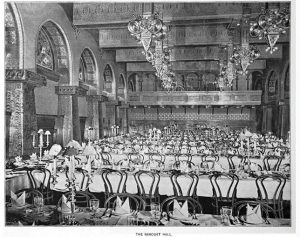
Ganz Hall was
originally a banquet hall
However, training someone to be both extraordinarily sensitive to the nuances of a line in a play or a passage of music, say, and also thick-skinned enough not to let criticism or indifference poison their confidence — well, that’s a paradox with which CCPA faculty members are intimately familiar.
“It’s called ‘show business’ for a reason,” said Sean Kelley, associate dean and director of the Theatre Conservatory. “All of our students come in with passion for the art, but they also need to comprehend the coldness of the industry and understand the principles of business and marketing. Character development is a different avenue than business development. To make this your career, you need both.”
On the credibility front, it helps that most of CCPA’s faculty are working artists themselves — members of the Chicago Symphony Orchestra, Chicago Lyric Opera, Joffrey Ballet, as well as actors and directors from various Chicago-area theaters — people who “know what they’re talking about” because they live and breathe it every day. In truth, this ethos of collaborative generosity between working professionals and aspiring students has been part of the school’s guiding philosophy since its inception.
The Genial Genius: Rudolph Ganz
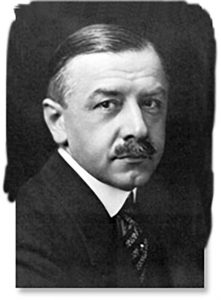
Ganz spent more than
70 years at Chicago Musical College, which merged in 1954 with Roosevelt University.
No one embodied these values more fully, or articulated them more eloquently, than the spiritual father of the Chicago Musical College, Rudolph Ganz, the Swiss piano legend who joined the faculty in 1900 and remained a fixture at the school for more than 70 years.
Ganz’s piano studio on the ninth floor of Roosevelt’s Auditorium Building has been preserved both as a monument to his genius and as vivid testimony to a musical life well lived. More than 100 photographs line the walls: signed portraits from the legends of his day (Toscanini, Ravel, Stravinsky); notes of gratitude from former students, many of whom went on to have illustrious careers themselves (John La Montaine, Dorothy Donegan, Marian Hall, Joseph Bloch); along with a veritable who’s who of musical luminaries from the first half of the 20th century.
Master piano students still use Ganz’s studio to practice, drawing inspiration from the history of the room. Also on the Auditorium’s seventh floor is Ganz Hall, an architectural marvel whose lovingly restored “electroliers” and stained-glass windows assert a bold, brash beauty entirely in concert with Ganz’s own ideas about music, education and life.
In Jeanne Colette Collester’s biography, Rudolph Ganz: A Musical Pioneer, Ganz is quoted as saying, “Music is one of the most powerful and important forces of education. It teaches two virtues that we are greatly in need of today: discipline in preparation and imagination in performance.”
“Music is one of the most powerful and important forces of education. It teaches two virtues that we are greatly in need of today: discipline in preparation and imagination in performance.”
– Rudolph Ganz, Chicago Musical College
Ludmila Lazar, a former student of Ganz and beloved CCPA piano faculty member, concurs: “It was his incessant search for meaning, for character, for truth in the music which was ever present,” she said. “He made me hear more than piano sounds; they became music of the orchestra, of nature, of the human soul.”
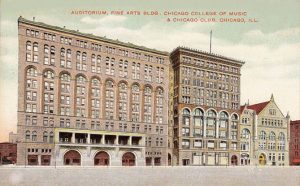
Auditorium Building, where Ganz Hall is currently housed.
This idea that music is much more than mere sound, that it has meaning and purpose and can serve as a guide to the contours of the soul, was the foundation upon which Ganz built his career as a performer and teacher. He was especially passionate about the performance aspect of the job. He taught “imagination in performance,” rather than technical perfection, because the connection he was striving for — that experience of sublime communication between performers and an audience — was based on the notion that a form of musical truth exists, and it is the artist’s responsibility to locate it.
“In many conservatories dedicated to professional training, there is a disconnect between the academic side (theory, form, etc.) and the performance side,” said Linda Berna, associate dean of the Music Conservatory. “Not here. We’ve made a conscious decision that it all works together.” By “all,” Berna means not only musical study and practice, but also literature, art, history, personal experience, intelligence, intuition and grit.
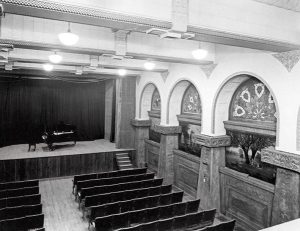
Ganz Hall
Berna came to Roosevelt 40 years ago as a piano student, and still remembers her years in the conservatory. “What struck me when I came was the atmosphere. It was vital and lively and really involved with the real world of music. The faculty were, and still are, active performers, and they taught differently. They taught us how to make music the way professionals make music.”
Though a certain level of technical excellence was expected, she said, lessons did not focus on the notes. “In piano, we’d have weekly performances and the faculty would critique us. They’d ask us questions like: ‘What are you trying to say with the music? What are you thinking while you are playing it?’ It was all about getting us to think consciously about what we were playing, and how to turn what we thought and felt about the music into a compelling performance.”
Creating Artist-Citizens
When the Chicago Musical College merged with Roosevelt University in 1954, it operated for years almost as a separate entity, due in part to the fact that not everyone in the CMC approved of the move. However, the University’s emphasis on social justice gradually seeped into the culture of CMC (and later, CCPA) via the notion of graduates as artist/citizens — people who see themselves as professional musicians and actors, yes, but also as ambassadors for the arts in the broader community and culture.
CCPA’s current dean, Henry Fogel, is a firm believer that artists are the conscience of culture, and he has solidified that belief into his mission statement and goals for the college. In fact, two of his stated goals for the future are: “To prepare our students for active and dedicated careers as socially conscious artist-citizens,” and “To develop an understanding of the need for artists of the future to advocate for the central place that the arts must hold in a healthy society.”
As a former president of the Chicago Symphony Orchestra and American Symphony Orchestra League, Fogel is all too aware of the precarious place even our most revered arts institutions occupy in the current cultural landscape.
“I think it’s important to teach students that going out and playing your instrument isn’t enough,” Fogel said. “Part of your role as an artist is to be an advocate for the arts and their place in a civilized society.”
“Part of your role as an artist is to be an advocate for the arts and their place in a civilized society.”
– Henry Fogel, Dean of CCPA
Another role important to the ongoing vitality of the arts, Fogel said, is seeding arts organizations with competent, principled leaders. Indeed, establishing Roosevelt as a leader among leaders in the arts is one of Fogel’s primary goals.
Since taking the reins at CCPA in 2009, he has created a master’s in performing arts administration program, one of the first of its kind in the country. He also recently established the Center for Arts Leadership, whose mission is “to educate the new generation of socially conscious artistic leadership” through coursework and projects that develop and reflect Roosevelt’s commitment to ethics, values and engaged citizenship.
Optimism Rewarded
Approximately 150 years ago when Florenz Ziegfeld, Sr. sifted through the ashes of the Great Chicago Fire and decided to forge ahead with his fledgling school, he could not have known or expected that it would survive as long as it has. There were only three other music conservatories in the United States at the time, so the school was an experiment, a big “what if” that offered no guarantee of success. Ziegfeld’s courage and optimism have been rewarded time and time again throughout the years, in moments both large and small.
When the performers at the Vivid 2018 showcase take the stage to share what they have learned during their time at CCPA, each performance will represent the culmination of a thousand tiny triumphs in the pursuit of artistic perfection. However effortless the performances may seem, they will in reality represent profound acts of courage — the kind of courage the CCPA has been instilling in students for 150 years, and with any luck will continue to do so for many more.
Wednesday, March 14, 7:30 p.m.
Auditorium Theatre of Roosevelt University
Join us as we mark the 150th anniversary of the Music Conservatory and the 20th anniversary of the Theatre Conservatory. The upcoming showcase will feature performances by some of CCPA’s most talented students, as well as a solo performance by CCPA’s renowned head of piano Winston Choi. Alumna Merle Dandridge (BFA, ’98), lead actress in the Oprah Winfrey Network hit drama series Greenleaf who has recently returned to Broadway to star in Once on This Island, will receive the first annual CCPA Distinguished Artist Award.
A ticketed pre-show Gala begins at 5:30 p.m. For information about the Gala and sponsorship opportunities, call (312) 341-3783. VIVID 2018 is a free event, but donations are encouraged to support CCPA students and programs. Free tickets can be reserved at auditoriumtheatre.org, (312) 341-2300, or the Auditorium Theatre Box Office.
For more information, visit roosevelt.edu/vivid or call (312) 431-2352.


